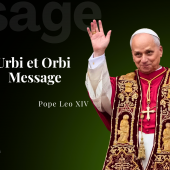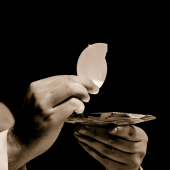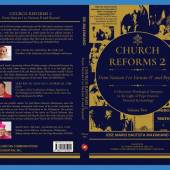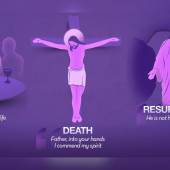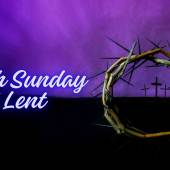Priesthood musings: Rich in name, but no money to buy new clothes
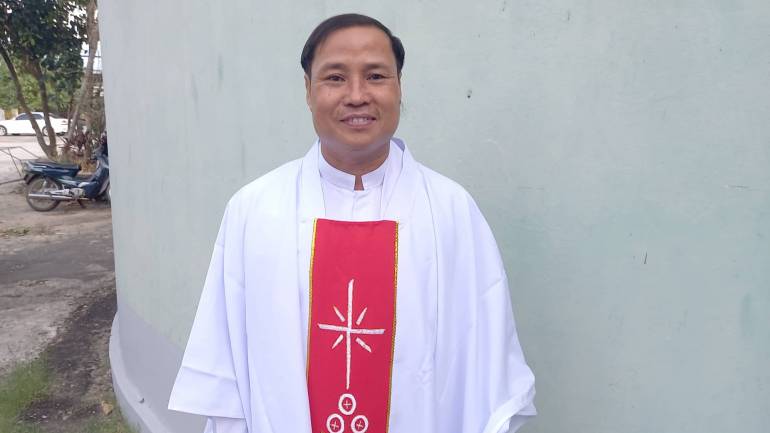
My name is Ngwe Htay which means rich in money or silver. When I entered the minor seminary in 1985, I did not have money to buy new clothes though I was rich in a name.
The old clothes that I had were a white shirt and green ‘longyi’ (a sheet of cloth widely worn in Myanmar for men. It is approximately 2 meters long and 80 centimeters wide).
I attended Grade 9 in a seminary located in Mayanchaung village in the Ayeyarwaddy Region of Myanmar.
Two pairs of clothes were not enough for me in the seminary. When my father heard about it, he sent an old longyi of his to me. With three old pairs of clothes, I joined the minor seminary.
After the minor seminary, I attended the Institute of Philosophy in Pyin Oo Lwin which was formerly known as May Myo in the Region of Mandalay is in the central part of the country.
When I arrived in Pyin Oo Lwin, the town where it is very cold, I could not buy many clothes as my friends did. I owned three pairs of trousers only. I had to use them even if they were torn.
Sadly, about one hundred clothes that belonged to seminarians and were dried under the sun were stolen one day. Out of three, two clothes of mine were stolen. I could not buy any new clothes because I did not have enough money to do so.
I washed the available clothes and dried them under the sun. But the weather was very cold in the region at that time. My washed clothes could not dry up.
Sometimes, I wore that wet clothes even if they were not fully dried. By wearing the wet cloth for a long time, I had a cold and got sick to my utter dismay.
With God’s grace, I could pass the Institute of Philosophy although I did not have enough clothes to be worn during my stay there. However, I could continue my seminary life with grit.
Then it was time for me to go to the next level of seminary education. When I arrived at the Institute of Theology, known as the Major Seminary in Yangon (former capital of Myanmar), I did not have any problems in the first year. But after three or four months in the second year, one donor came to our major seminary and offered us a meal with chicken curry to us out of mercy.
It was a joyful day for all and I had the meal to the full. It was very delicious. But after lunch, many seminarians had stomach pain and diarrhea on that day. We were all distressed and angry.
Later, we came to know the reason why we got sick. The chickens we ate were recently injected. For that reason, we got stomach problems. Almost all seminarians suffered from that disease.
Most of my companions could recover after one or two days. But for me, it took more than three weeks.
Consequently, my health conditions affected my studies. I failed every examination in the seminary. My grade was zero. There was no one to understand me. I approached every professor for help. But what they said to me was, “You were very sickly and cannot continue the training.” They advised me saying it is better to go back home and change my priestly vocation to married life.
I reflected on my skinny body. In my thoughts, no one was interested in me because I was thinner than a dry garfish. I prayed a lot. And I tried my best to become a priest. Later on, I was successful with God’s bountiful graces.
Thankfully, I was ordained a priest in 1997. We were 15 candidates who entered a seminary. Out of 15, only one became a priest. Others left their seminary training. I was the only seminarian who became a priest although no one expected it due to my illness.
On April 7, 2022, I mark 25 years of my priesthood.
(Father Ngwe Htay whose baptismal name is Michael is currently the rector of the Minor Seminary of the Sacred Heart of Jesus in Mayanchaung village in the township of Pathein in the Ayeyarwaddy Region where the Diocese of Pathein is located. He was a former professor at the Institute of Philosophy in Pyin Oo Lwin from 2003 to 2013. This reflection is taken from Father Michael Ngwe Htay’s homily which was delivered in Burmese during a thanksgiving Mass on April 7, 2022, and translated by RVA Pwo Karen into English).
Radio Veritas Asia (RVA), a media platform of the Catholic Church, aims to share Christ. RVA started in 1969 as a continental Catholic radio station to serve Asian countries in their respective local language, thus earning the tag “the Voice of Asian Christianity.” Responding to the emerging context, RVA embraced media platforms to connect with the global Asian audience via its 21 language websites and various social media platforms.









